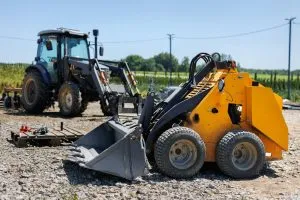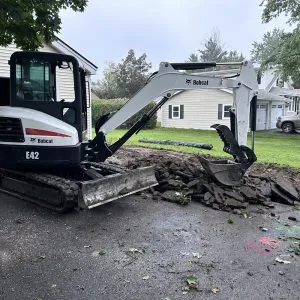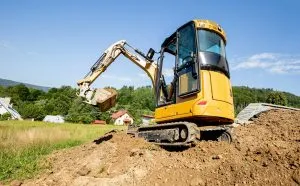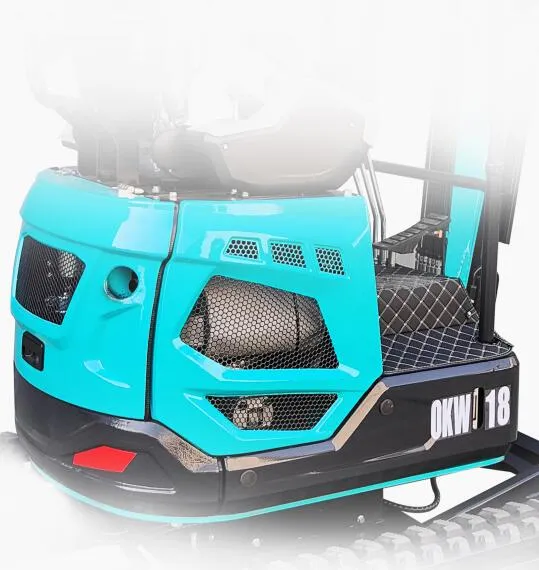Owning a mini excavator can be a highly profitable venture for individuals and businesses alike, depending on several factors such as usage, market demand, and proper management of the asset. These versatile machines are widely used in construction, landscaping, agriculture, and various other industries, making them a valuable tool for many small and large projects. This article explores the profitability of owning a mini excavator by examining costs, potential revenue streams, and the benefits associated with these powerful machines.

1. Understanding Mini Excavators: A Brief Overview
1.1. What is a Mini Excavator?
A mini excavator, also known as a compact excavator, is a small-sized piece of construction equipment designed for digging, trenching, and demolishing tasks. These machines are typically used in smaller construction projects where space is limited. They range in size from about one ton to several tons, making them ideal for residential and light commercial use.
1.2. Key Features and Capabilities
Mini excavators come with various features that make them incredibly useful on job sites:
- Compact Size: Their small size allows them to maneuver in tight spaces where larger excavators cannot.
- Versatility: They can be equipped with different attachments such as buckets, augers, and breakers, allowing them to perform a wide range of tasks.
- Ease of Transportation: Due to their lightweight, mini excavators can be easily transported on a standard trailer, reducing logistics costs.
1.3. Market Demand for Mini Excavators
The demand for mini excavators has been on the rise due to the growing need for efficient and versatile machinery in urban construction, landscaping, and utility work. This demand drives the profitability of owning such equipment, as they are often rented out or used in various projects to generate income.

2. Initial Costs of Purchasing a Mini Excavator
2.1. Purchase Price
The purchase price of a mini excavator varies based on its size, brand, and features. On average, a new mini excavator can cost anywhere from $20,000 to $100,000. Larger or more advanced models with additional features can be even more expensive. However, if you consider buying in China, the purchase price may be half or even less.
2.2. Financing Options
Many equipment dealers offer financing options that allow buyers to spread the cost over several years. This can make the upfront cost more manageable and allow the owner to start generating revenue while paying off the machine.
2.3. Depreciation Considerations
Like all machinery, mini excavators depreciate over time. The rate of depreciation depends on factors such as the brand, model, and usage. However, mini excavators tend to retain their value well compared to other heavy machinery, especially if they are maintained properly.

3. Operational Costs of Owning a Mini Excavator
3.1. Maintenance and Repairs
Regular maintenance is essential to keep the mini excavator in good working condition and to prevent costly breakdowns. This includes oil changes, filter replacements, and checking hydraulic systems. Maintenance costs can range from $1,000 to $3,000 annually, depending on usage.
3.2. Fuel Costs
Fuel efficiency is a significant factor in the operational cost of a mini excavator. These machines typically run on diesel, and their fuel consumption varies based on the intensity of use. On average, a mini excavator might consume between 1 to 2 gallons of diesel per hour, translating to about $3 to $6 per hour in fuel costs, depending on diesel prices.
3.3. Insurance and Licensing
Insurance is necessary to protect against potential accidents or damages. The cost of insuring a mini excavator can vary widely based on factors such as the operator’s experience, location, and the machine’s value, but it typically ranges from $500 to $1,500 per year. Additionally, some regions require specific licensing for operating such machinery, which can add to the overall cost.
4. Revenue Generation Through Mini Excavator Ownership
4.1. Direct Usage in Business
For businesses in construction, landscaping, or agriculture, owning a mini excavator can reduce the need to rent equipment, thereby lowering project costs and increasing profit margins. Regular use of the machine in various projects ensures that it generates consistent revenue, making it a valuable asset.
4.2. Renting Out the Mini Excavator
One of the most popular ways to generate income from a mini excavator is by renting it out when it’s not in use. Rental rates for mini excavators can range from $200 to $500 per day, depending on the size and features of the machine, as well as the local market demand. This can lead to substantial earnings, especially if the machine is rented out frequently.
4.3. Contracting Services
Some mini excavator owners choose to offer contracting services, where they not only rent out the machine but also operate it for clients. This allows them to charge higher rates since they are providing both the equipment and the expertise to operate it efficiently. This service can command fees ranging from $75 to $150 per hour, depending on the complexity of the job and the region.

5. Evaluating the Profitability of Owning a Mini Excavator
5.1. Cost-Benefit Analysis
To determine the profitability of owning a mini excavator, it’s essential to conduct a cost-benefit analysis. This involves comparing the total costs of ownership (purchase, maintenance, fuel, insurance) against the potential revenue (rental income, contracting services, savings from not renting).
5.2. Break-Even Point
The break-even point is when the revenue generated from the mini excavator equals the total costs of owning it. For many owners, this point can be reached within the first few years, depending on how frequently the machine is used or rented out.
5.3. Long-Term Profit Potential
Over time, as the mini excavator continues to generate revenue beyond its break-even point, it becomes increasingly profitable. Well-maintained machines can have a lifespan of 10 to 15 years or more, allowing for significant long-term profits.

6. Tax Benefits and Incentives
6.1. Depreciation Deductions
In many countries, the cost of purchasing a mini excavator can be deducted over time through depreciation. This reduces the taxable income for the business, effectively lowering the cost of ownership.
6.2. Section 179 Deduction (USA)
In the United States, the Section 179 deduction allows businesses to deduct the full purchase price of qualifying equipment, like mini excavators, in the year they are bought. This can result in substantial tax savings, making it more affordable to invest in such machinery.
6.3. Other Tax Incentives
Other tax incentives may include deductions for fuel costs, maintenance expenses, and interest on financing. These incentives can further enhance the profitability of owning a mini excavator.
7. Risks and Challenges of Owning a Mini Excavator
7.1. Market Fluctuations
The demand for mini excavators can fluctuate based on economic conditions, construction trends, and regional factors. During economic downturns, the demand for construction equipment may decrease, potentially reducing rental income and making it more challenging to cover costs.
7.2. Competition in the Rental Market
The rental market for mini excavators can be competitive, especially in regions with a high concentration of equipment rental businesses. To stay profitable, owners must price their rentals competitively while ensuring they provide well-maintained and reliable machines.
7.3. Potential for Damage and Downtime
Accidents and equipment breakdowns can lead to costly repairs and downtime, reducing the profitability of the machine. Proper training for operators and regular maintenance are crucial to minimize these risks.

8. Maximizing the Profitability of a Mini Excavator
8.1. Regular Maintenance and Care
Regular maintenance not only extends the lifespan of the mini excavator but also ensures it operates efficiently, reducing fuel consumption and the risk of breakdowns. This can significantly improve profitability over time.
8.2. Diversifying Revenue Streams
To maximize profits, mini excavator owners should consider diversifying their revenue streams. This could include offering specialized attachments for rent, providing training services, or expanding into new markets such as utility work or agricultural projects.
8.3. Strategic Marketing and Networking
Effective marketing can help attract more rental clients and contracting opportunities. Building relationships with local contractors, landscapers, and property developers can lead to repeat business and referrals, enhancing profitability.
9. Case Studies: Real-World Examples of Mini Excavator Profitability
9.1. Small Landscaping Business
A small landscaping business invested in a mini excavator to avoid the recurring cost of renting equipment. Over five years, the machine was used in numerous projects, saving the business thousands in rental fees. Additionally, the business rented out the excavator during off-peak seasons, generating extra income. The investment paid for itself within three years, and the machine continued to generate profit afterward.
9.2. Independent Contractor
An independent contractor purchased a mini excavator to offer specialized excavation services. By renting out the machine when not in use and offering his services as an operator, he was able to achieve a steady income stream. The combination of rental income and contracting work allowed him to reach the break-even point within two years, after which the machine became a significant profit center.
9.3. Equipment Rental Company
An equipment rental company added several mini excavators to its fleet to meet the growing demand in its region. By offering competitive rates and ensuring the machines were well-maintained, the company saw a rapid return on investment. The mini excavators quickly became one of the most popular items in the rental fleet, contributing significantly to the company’s overall profitability.

10. Future Trends and the Impact on Mini Excavator Profitability
10.1. Technological Advancements
Technological advancements, such as telematics and automation, are improving the efficiency and safety of mini excavators. These innovations can reduce operating costs and increase the machine’s appeal to renters and buyers, thereby enhancing profitability.
10.2. Environmental Considerations
As environmental regulations become stricter, there is a growing demand for fuel-efficient and low-emission machinery. Mini excavators that meet these requirements may command higher rental rates and resale values, contributing to greater profitability.
10.3. Economic and Industry Trends
The profitability of owning a mini excavator will continue to be influenced by broader economic and industry trends. Urbanization, infrastructure development, and the rise of small-scale construction projects are likely to sustain the demand for mini excavators in the coming years.
11. Conclusion: Is Owning a Mini Excavator Profitable?
Owning a mini excavator can be a highly profitable investment, provided that the owner carefully manages costs and capitalizes on revenue opportunities. The combination of direct use, rental income, and potential tax benefits can make these machines a valuable asset for businesses and independent contractors alike. While there are risks involved, such as market fluctuations and maintenance costs, the overall potential for profit is significant.
By understanding the costs, exploring revenue streams, and staying informed about industry trends, owners can maximize the profitability of their mini excavators. Whether for personal use in a business or as a rental asset, a well-maintained mini excavator can provide years of reliable service and substantial financial returns.






